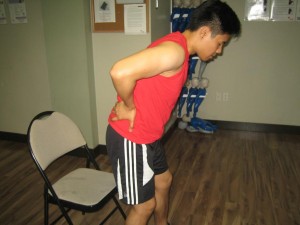An individual with a stiff hip might have difficulty engaging in various activities such as walking, moving from sitting to standing, jumping or running. With every step or movement, it can trigger intense pain.
Even though the symptoms of a stiff hip might be brief, other cases might result to lasting discomfort if not properly treated.
What are the causes?
A stiff hip might be the outcome of a short-term injury or part of a chronic disorder. The possible injuries that might occur include hip dislocation, fracture or sprain in which the hip ligament is overly stretched or torn.
An individual might also experience a stiff hip after an exercise routine due to tight hip flexor muscles but this is a transitory condition.
Other chronic conditions linked with a stiff hip include the following:
- Juvenile arthritis
- Tendinitis
- Ankylosing spondylitis
- Trochanteric bursitis
- Rheumatoid arthritis
- Lyme disease

A stiff hip is a sensation that the hip joint could not easily move normally and generally sore. - Osteoarthritis
Indications of a stiff hip
A stiff hip is a sensation that the hip joint could not easily move normally and generally sore. There is a feeling as if the hip is popping or clicking during movement. The range of motion might also be affected. Oftentimes, the stiffness might make movement a lot slower than before.
When to seek medical care
Sustaining a hip dislocation or fracture is a usual cause for a stiff hip. When it comes to a fracture, it usually occurs after a fall or a direct blow to the hip. It is vital to seek immediate medical care if the following are present:
- Fever
- Chills
- Sudden manifestation of skin rashes around the hip
- Lightheaded or feeling faint
- Intense pain particularly in the groin or upper thigh that can intensify if lifting the leg up or rotating it outward
- Evident changes to the hip joint such as deformity
Management
The treatment for a stiff hip usually depends on the underlying cause. If the cause is a hip fracture, it is corrected using surgery while a dislocation can be remedied either non-surgically or surgically. Hip arthritis does not have a cure and managed with anti-inflammatory pain medications and physical therapy.
The commonly used home remedies for a stiff hip include the following:
- Application of an ice pack or heat pack on the affected hip. Make sure that the pack is covered or wrapped with a towel or cloth to prevent frostbite or burns on the skin.
- Stretching of the hip muscles to minimize tension
- Performing physical or occupational therapy exercises to improve mobility
- Allowing the hip joint to rest
- Anti-inflammatory medications such as ibuprofen and naproxen can be given to reduce the pain.

